Iran Announces Sanctions On Former US Officials As Talks Stall
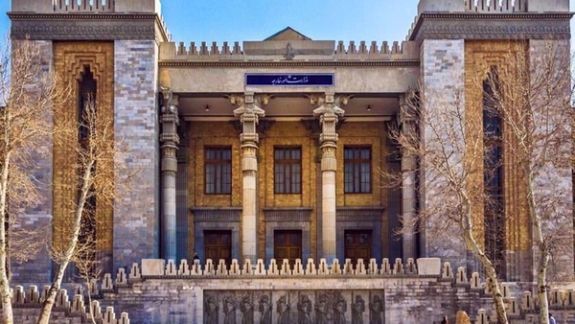
Iran on Saturday imposed sanctions on 24 more Americans in a largely symbolic move, as months of talks to revive a 2015 nuclear deal have stalled.

Iran on Saturday imposed sanctions on 24 more Americans in a largely symbolic move, as months of talks to revive a 2015 nuclear deal have stalled.
Among those sanctioned are former Army Chief of Staff George Casey and former President Donald Trump's attorney Rudy Giuliani.
Almost all the people named were officials who served during Trump's administration, which imposed sanctions on Iranian officials, politicians and companies and withdrew the United States from Iran's nuclear agreement with world powers.
In a statement carried by local media, the Iranian Foreign Ministry accused the sanctioned Americans - who also included several business figures and politicians - of supporting "terrorist groups and terrorist acts" against Iran, and Israel's "repressive acts" in the region and against Palestinians.
Eleven months of indirect talks between Iran and the United States in Vienna on salvaging the 2015 deal have stalled as both sides say political decisions are required by Tehran and Washington to settle the remaining issues.
Gen. Austin Scott Miller, former commander of US forces in Afghanistan, former Commerce Secretary Wilbur Ross, and several former ambassadors are among the officials targeted by the new Iranian sanctions.
In a similar move announced in January, Iran imposed sanctions on 51 Americans, many of them from the U.S. military, over the 2020 killing of General Qassem Soleimani in a drone strike in Iraq.
Last year, it imposed sanctions on Trump and several senior US officials.

An Iranian lawmaker says the parliament is prepared to impeach President Ebrahim Raisi's economic ministers, but Majles leaders intentionally delay the process.
Lotfollah Siahkali, a lawmaker from Ghazvin and a member of the Iranian parliament's Industry Committee, said in an interview with Rouydad24 news website that the motion to impeach Iran's Industry Minister was handed over to the presidium in early March, but the body has still not put it on parliament’s agenda.
The Majles (parliament) began to warn Raisi about the weak performance of his economic team including the ministers of industry (Reza Fatemi Amin), labor (Hojjat Abdolmaleki) and economy (Ehsan Khandouzi), two months after Raisi took office in August 2021. Since then, Raisi has said repeatedly that he is planning a reshuffling but has not done anything yet. He had promised both during his election campaign and in the following months that he was adamant to improve the critical economic situation of ordinary people.
In the meantime, lawmakers have renewed their calls for impeachments almost every month. Siahkali said the ministers have been constantly lobbying with the Majles presidium to delay their impeachment. At least in one case, Majles Speaker Mohammad Bagher Ghalibaf told the lawmakers to wait until the Iranian New Year in late March before beginning to table the impeachment motion for the labor minister.
While the government claims it is exporting more oil and gas, inflation remains high, with people falling deeper into poverty. Lawmakers want to know why the situation is not improving.
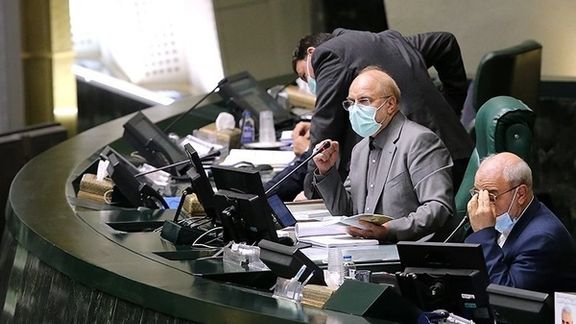
Some have concluded that either the government is not telling the truth about boosting oil and gas exports, or it is spending the revenues on something other than improving the people's livelihood.
Siahkali is focused on the plan to impeach the industry minister by pointing out his failures and make sure that none of the economic ministers can avoid being impeached.
At the same time, complaints about the performance of other economic ministers have been on the rise. Iranian economist and Al-Zahra University academic Hossein Raghfar said this week that rising inflation and the consequences of handing over oil sales to powerful institutions outside the oil ministry and the National Iranian Oil Company, mainly to military entites such as the IRGC, are two of the problems created by the Raisi administration for Iran's ailing economy.
While some of the economists in Iran have predicted a triple-digit inflation rate in the coming, Raghfar said in his interview with the Iranian Labor News Agency (ILNA) that inflation will certainly rise further, while the government keeps publishing unrealistic figures, which people cannot believe.
He insisted handing over oil sales to the military sharply raises the cost of economic transactions and will lead to widespread corruption. All this will adversely affect the economy by creating instability that deterring investments. He added: "In this situation, we can say with a good degree of certainty that the recession and inflation, which overwhelmed the economy in the 2010s will continue."
Meanwhile Raghfar argued that even if a nuclear deal is signed and sanctions lifted, it will not be easy for Iran to solve its economic crisis. "I believe even without foreign economic problems; Iran's economy will find it hard to recover. There might be some additional revenue, but this will not affect the situation of investment and employment." He added that the Iranian government does not seem to have any solution to tackle these problems in the future.
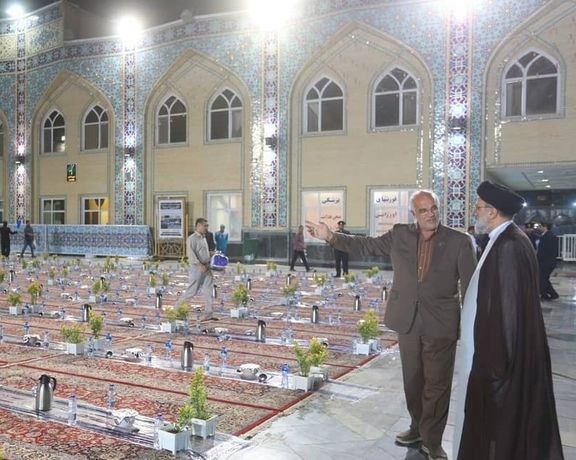
Some Iranian media report that an Iftar dinner by Iranian president Ebrahim Raisi was cancelled after most invited guests who were artists declined to attend.
Sharq newspaper and others reported Saturday that the Ramadan dinner, or Iftar, scheduled for Friday was cancelled after “99 percent” of artists, actors and film industry personalities declined invitations using various excuses, such as the Covid pandemic, travel or other reasons.
The government’s official news website IRNA strongly denied the reports as “complete fabrication”, insisting that the Iftar was cancelled due to high air pollution in Tehran. IRNA added that the dinner was supposed to be served in an open courtyard of the presidential complex but due to pollution it was decided to hold indoors, but the space was too small for accommodating 170 guests.
Sharq, however, emphasized that the real reason for the cancellation was the refusal of most invitees to attend.
The Iftar invitation by the president for artists and cinema figures has become an annual tradition in recent years. In 2018, many declined the invitation by then-president Hassan Rouhani, saying that he had not fulfilled his election promises.
Raisi’s leadership is being sharply criticized in the media, as Iran’s economic conditions deteriorate, and food prices continue to rise. Reports say that many working class people cannot afford even bread and buy it with a promise to bakeries to pay later.
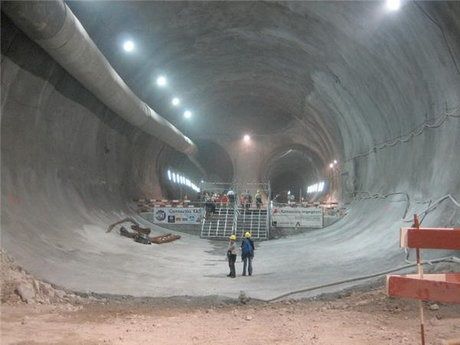
Over 20 people arrested during protests seven years ago against water scarcity and distribution policies in south-west Iran have been sentenced to prison and lashes, the United States-based Human Rights Activists' News Agency (HRANA) said Saturday.
HRANA reported that those sentenced were arrested in Chaharmahal-Bakhtiari province in 2015 during protests against plans to transfer water from their town, and were holding a symbolic mourning ceremony for the drying up of a spring.
After a complaint by Khatam-al Anbiya Construction Headquarters, the engineering and construction arm of the Revolutionary Guard, the protestors were sentenced to up to seven years in prison and 74 lashes on charges of disturbing public order and destroying public property. They denied the charges.
Chaharmahal-Bakhtiari, a traditionally water-rich region in the Zagros mountains, has seen its water resources decline due to both drought and projects to irrigate arid regions. Protests in Chaharmahal-Bakhtiari broke out again last year in response to demonstrations in Esfahan over the drying up of the Zayandeh Roud river, which rises in Chaharmahal-Bakhtiari.
Drought and desertification across the Middle East in recent years has fed tensions between and within states over water. The government’s encouragement of water-intensive industries in Yazd, east of Esfahan, diverting water, has also contributed to farmers in Chaharmahal-Bakhtiari facing shortages.
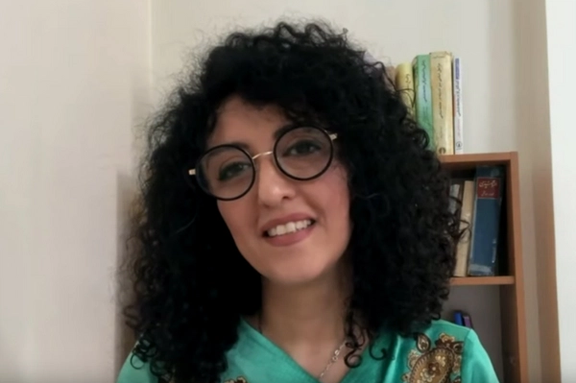
A prominent Iranian rights defender argues that sanctions should target violators of human rights in Iran, such as the Revolutionary Guards, not the people.
Speaking to Iran International TV on Friday, Narges Mohammadi said Western sanctions have failed to weaken Iran's oppressive regime but led to a "disastrous weakening of the Iranian middle class as the driving force of democracy".
The sanctions failed, she argued, because they were not "targeted" and Western politicians did not have adequate knowledge of the Islamic Republic system.
"It appears that the West lacks a proper understanding of the hypocrisy of the Islamic Republic and that it is a dictatorial government with systemic financial corruption that can use various tools [of repression]," she told Iran International.
There has been huge social media controversy over Mohammadi's views over sanctions after a Washington Post opinion article Wednesday referring to interviews with her in which she said sanctions weaken Iran’s civil society.
Critics attacked Mohammadi accusing her of defending the lifting of US sanctions, and her approach benefits the regime and the Revolutionary Guards (IRGC) which is also under US sanctions.
The controversy gained more attention among Iranians because the Washington Post article coincided with Iran’s demand from the Biden administration to remove the IRGC from its foreign terrorist list as a condition for the revival of the 2015 nuclear agreement.
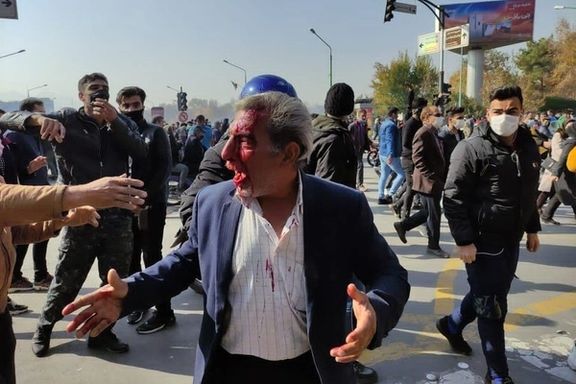
Mohammadi told Iran International that in the interview with the Washington Post she had said that she considers the IRGC as an oppressive force and a violator of human rights and that it must be targeted by the international community by various means including sanctions but not all her comments had been included in the article.
Mohammadi also explained that she believes the international community has the duty to target "any person or group" in the Islamic Republic that violates human rights to support the Iranian people and civil society and one of the ways to target the violators is using sanctions.
Mohammadi added that the IRGC's "political, terroristic, and economic investments and activities", both inside and outside the country, result in oppression of the Iranian civil society and therefore it must be placed on the list of "targeted" international sanctions along with other entities of the Islamic Republic that violate human rights such as its Judiciary and Police.
Some harshly attacked her integrity and questioned her honesty as a regime critic, while others said she should have been more careful during the interview with the author of the Washington Post opinion article, Jason Rezaian.
Mohammadi has an eight-year sentence hanging over her head for supposed “crimes against national security”, for her activities as a human rights activist and may be hauled off to prison any moment to serve it.
Cofounder and chair of the Defenders of Human Rights Center, Mohammadi has been to jail several times over the past two decades. She was freed from Evin prison in September 2020 after serving five and half years when she had no contact with her husband and children for long periods of time.
But one of Mohammadi's supporters in a tweet Thursday said she could not understand why she was criticized so strongly. "She has said that sanctions destroy the civil society. Do you doubt this statement? wrote Banafsheh Jamali, a feminist activist. "People are not going to have any demands other than economic ones when they are in dire need of food to survive," she added.
Some argue that it is difficult to put in place effective sanctions that do not lead to economic pressure on the people, and mention the example of Russia. If the government is supposed to be pressured to stop a certain behavior, it must feel economic pressure, which invariably also impacts the people.
Others say that the civil society Mohammadi refers to has not been able to reform the Islamic Republic and has been badly suppressed, so sanctions are the remaining tool to bring about a change.
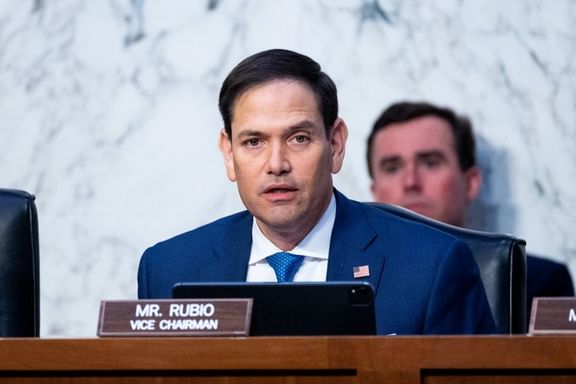
A group of US Republican senators have called on the administration to provide Israel with the military capabilities it needs to defend itself from a nuclear-armed Iran.
In a letter led by Florida Senator Marco Rubio, 11 senators told President Joe Biden that his new nuclear deal with Iran will provide the regime with a pathway to nuclear weapons and warned of major negative regional implications of a nuclear-armed Iran.
Stressing the necessity for a course-direction, they said, the new agreement “would put at risk the existence of the State of Israel and the governments of our Arab allies, destroy America’s position in the Middle East, and ultimately threaten the US homeland”.
The senators also warned of the grave threats of Iran’s ballistic missile arsenal, its support for terrorism, and other destabilizing activities in the Middle East.
“The Iranian regime arms the Houthis in Yemen with the missiles and drones that they use to attack civilian targets in Saudi Arabia and the United Arab Emirates”, they wrote, adding that “Iran equips Hezbollah and Hamas with tens of thousands of rockets”.
They also highlighted the escalation of attacks against Americans in Iraq, particularly the ballistic missile attack near the US consulate in Erbil.
Iran has demanded that its Revolutionary Guard be removed from the US list of terrorist organizations, a move that many say put Iran and Israel on a collision course.